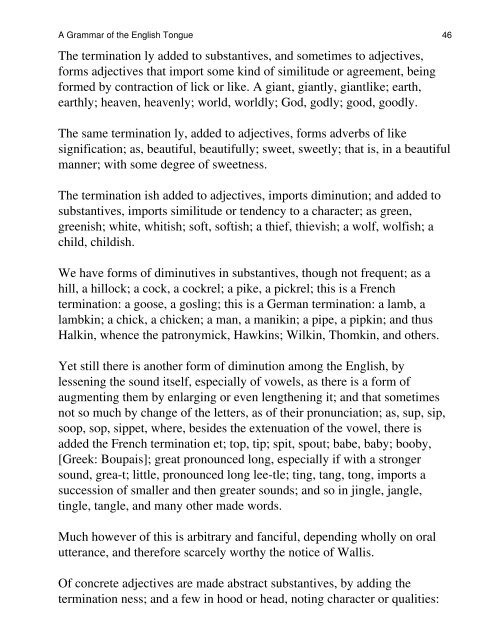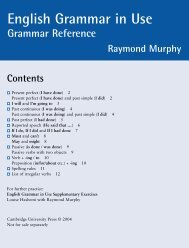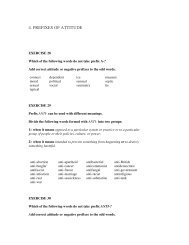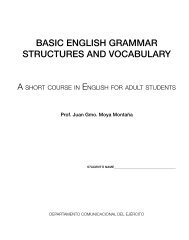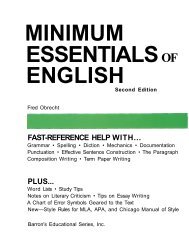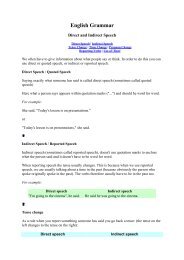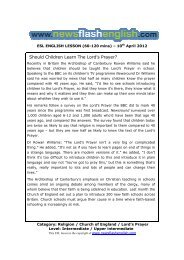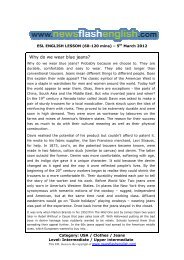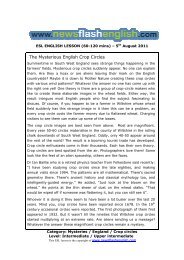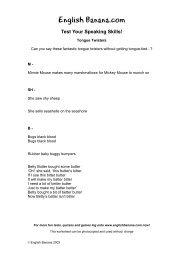A Grammar of the English Tongue - ESL Teachers Board
A Grammar of the English Tongue - ESL Teachers Board
A Grammar of the English Tongue - ESL Teachers Board
Create successful ePaper yourself
Turn your PDF publications into a flip-book with our unique Google optimized e-Paper software.
A <strong>Grammar</strong> <strong>of</strong> <strong>the</strong> <strong>English</strong> <strong>Tongue</strong> 46The termination ly added to substantives, and sometimes to adjectives,forms adjectives that import some kind <strong>of</strong> similitude or agreement, beingformed by contraction <strong>of</strong> lick or like. A giant, giantly, giantlike; earth,earthly; heaven, heavenly; world, worldly; God, godly; good, goodly.The same termination ly, added to adjectives, forms adverbs <strong>of</strong> likesignification; as, beautiful, beautifully; sweet, sweetly; that is, in a beautifulmanner; with some degree <strong>of</strong> sweetness.The termination ish added to adjectives, imports diminution; and added tosubstantives, imports similitude or tendency to a character; as green,greenish; white, whitish; s<strong>of</strong>t, s<strong>of</strong>tish; a thief, thievish; a wolf, wolfish; achild, childish.We have forms <strong>of</strong> diminutives in substantives, though not frequent; as ahill, a hillock; a cock, a cockrel; a pike, a pickrel; this is a Frenchtermination: a goose, a gosling; this is a German termination: a lamb, alambkin; a chick, a chicken; a man, a manikin; a pipe, a pipkin; and thusHalkin, whence <strong>the</strong> patronymick, Hawkins; Wilkin, Thomkin, and o<strong>the</strong>rs.Yet still <strong>the</strong>re is ano<strong>the</strong>r form <strong>of</strong> diminution among <strong>the</strong> <strong>English</strong>, bylessening <strong>the</strong> sound itself, especially <strong>of</strong> vowels, as <strong>the</strong>re is a form <strong>of</strong>augmenting <strong>the</strong>m by enlarging or even leng<strong>the</strong>ning it; and that sometimesnot so much by change <strong>of</strong> <strong>the</strong> letters, as <strong>of</strong> <strong>the</strong>ir pronunciation; as, sup, sip,soop, sop, sippet, where, besides <strong>the</strong> extenuation <strong>of</strong> <strong>the</strong> vowel, <strong>the</strong>re isadded <strong>the</strong> French termination et; top, tip; spit, spout; babe, baby; booby,[Greek: Boupais]; great pronounced long, especially if with a strongersound, grea-t; little, pronounced long lee-tle; ting, tang, tong, imports asuccession <strong>of</strong> smaller and <strong>the</strong>n greater sounds; and so in jingle, jangle,tingle, tangle, and many o<strong>the</strong>r made words.Much however <strong>of</strong> this is arbitrary and fanciful, depending wholly on oralutterance, and <strong>the</strong>refore scarcely worthy <strong>the</strong> notice <strong>of</strong> Wallis.Of concrete adjectives are made abstract substantives, by adding <strong>the</strong>termination ness; and a few in hood or head, noting character or qualities:


